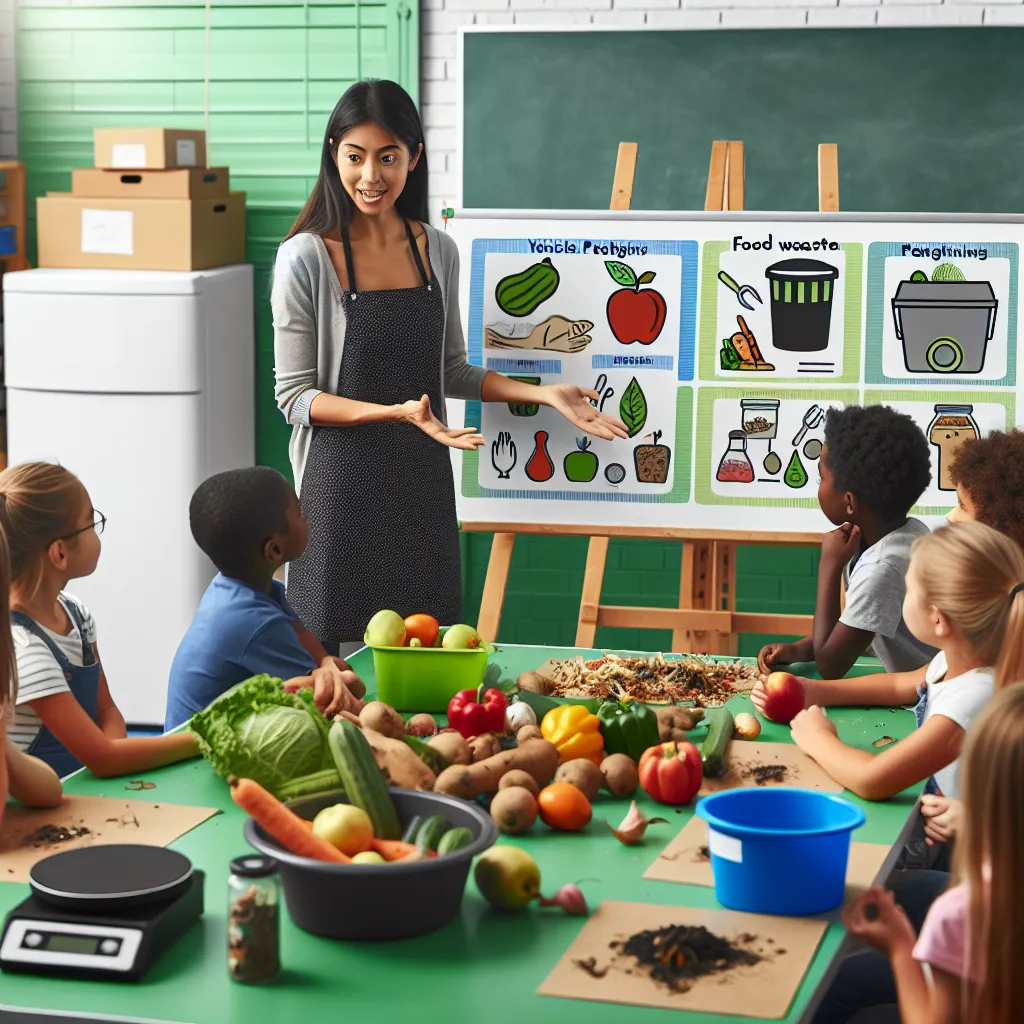Food waste is a critical global issue that has been gaining increasing attention in recent years. As a result, it’s no surprise that the topic of reducing food waste through education and technology has become a recurring theme in IELTS Writing Task 2 essays. Based on analysis of past IELTS exams and current trends, we can expect this topic to appear frequently in future tests. Let’s explore a relevant question and provide sample essays for different band scores.
Nội dung bài viết
Analyzing the Question
Some people believe that education and technology are the most effective ways to reduce food waste. To what extent do you agree or disagree?
This question asks you to consider the role of education and technology in reducing food waste. It’s an opinion-based question that requires you to:
- Clearly state your position (agree, disagree, or partially agree)
- Provide reasons and examples to support your view
- Discuss the effectiveness of education and technology in addressing food waste
- Consider other potential solutions or factors if you partially agree or disagree
Sample Essay 1: Band 8
Food waste is a pressing global issue with significant environmental and economic implications. While there are various approaches to tackling this problem, I strongly agree that education and technology are indeed the most effective ways to reduce food waste. This essay will explore how these two factors can work synergistically to create substantial and lasting change in our food consumption habits.
Education plays a crucial role in raising awareness and changing behaviors related to food waste. By incorporating food waste reduction strategies into school curricula and public awareness campaigns, we can instill a sense of responsibility and mindfulness in individuals from a young age. For instance, lessons on meal planning, proper food storage, and creative use of leftovers can equip people with practical skills to minimize waste in their daily lives. Moreover, education can help dispel common misconceptions about food expiration dates, which often lead to premature disposal of perfectly edible items.
Technology, on the other hand, provides innovative solutions to optimize food production, distribution, and consumption. Smart refrigerators with inventory tracking capabilities can alert users when food items are approaching their expiration dates, prompting timely use. Additionally, mobile apps that connect consumers with restaurants and grocery stores offering discounted surplus food have gained popularity, effectively reducing waste while benefiting both businesses and budget-conscious shoppers. In the agricultural sector, precision farming technologies enable more efficient crop production, reducing overproduction and subsequent waste.
The synergy between education and technology amplifies their effectiveness in combating food waste. For example, educational initiatives can promote the adoption of food-saving technologies, while technological advancements can enhance the reach and impact of educational programs through e-learning platforms and interactive digital content. This symbiotic relationship creates a comprehensive approach to tackling food waste at multiple levels of society.
While other methods such as policy changes and infrastructure improvements also contribute to reducing food waste, I believe that education and technology form the foundation for sustainable, long-term solutions. By fostering a culture of awareness and providing the tools necessary for efficient food management, these two factors have the potential to drive significant behavioral changes and systemic improvements in our food systems.
In conclusion, education and technology are undoubtedly the most effective ways to reduce food waste. Their combined impact on individual behaviors, business practices, and societal norms creates a powerful force for positive change. As we continue to face global challenges related to food security and environmental sustainability, investing in education and technological innovation will be key to creating a more efficient and responsible food consumption culture.
 Educating children about food waste
Educating children about food waste
Analysis of Band 8 Essay
This essay demonstrates excellence in several key areas:
-
Task Achievement: The essay fully addresses all parts of the task, presenting a clear position and developing it throughout.
-
Coherence and Cohesion: The essay is well-organized with clear paragraphing and effective use of cohesive devices.
-
Lexical Resource: A wide range of vocabulary is used accurately and appropriately, including topic-specific terms.
-
Grammatical Range and Accuracy: The essay showcases a variety of complex sentence structures with minimal errors.
-
Critical Thinking: The essay demonstrates sophisticated analysis of the issue, considering multiple aspects and their interrelationships.
Sample Essay 2: Band 7
Food waste is a significant problem in many countries, and finding effective solutions is crucial. I largely agree that education and technology are among the most effective ways to reduce food waste, although I believe other factors also play important roles.
Education can significantly impact people’s attitudes and behaviors towards food waste. By teaching individuals about the consequences of wasting food and providing practical tips for reducing waste, we can create a more conscientious society. For example, schools could incorporate lessons on proper food storage and creative ways to use leftovers into their curricula. Public awareness campaigns can also educate adults about the environmental and economic impacts of food waste, encouraging them to make more responsible choices.
Technology offers innovative solutions to minimize food waste throughout the supply chain. Smart packaging that indicates when food is truly spoiled, rather than relying on arbitrary expiration dates, can prevent the unnecessary disposal of edible items. Additionally, apps that connect consumers with restaurants or grocery stores offering discounted surplus food help reduce waste while providing affordable options for budget-conscious shoppers. In the agricultural sector, precision farming techniques can optimize crop yields and reduce overproduction.
However, while education and technology are crucial, other factors also contribute to reducing food waste. Government policies, such as regulations on food labeling and incentives for businesses to donate excess food, can create systemic changes. Improving infrastructure for food storage and transportation in developing countries can also significantly reduce waste due to spoilage.
In conclusion, I believe that education and technology are indeed highly effective ways to reduce food waste, but they are part of a broader solution that includes policy changes and infrastructure improvements. A comprehensive approach that combines these various strategies is likely to yield the best results in tackling this complex issue.
Analysis of Band 7 Essay
This essay demonstrates good performance in several areas:
-
Task Achievement: The essay addresses all parts of the task and presents a clear position.
-
Coherence and Cohesion: The essay is well-organized with clear paragraphing and appropriate use of linking words.
-
Lexical Resource: A good range of vocabulary is used, with some attempts at less common words.
-
Grammatical Range and Accuracy: The essay uses a mix of simple and complex sentence structures with generally good control.
-
Critical Thinking: The essay shows good analysis of the issue, considering multiple aspects and presenting a nuanced view.
Sample Essay 3: Band 6
Food waste is a big problem in many countries. I agree that education and technology are good ways to reduce food waste, but I think there are other important ways too.
Education can help people understand why food waste is bad. Schools can teach students about not wasting food and how to use food better. For example, they can learn how to store food properly and use leftovers. Also, TV programs and social media can tell adults about food waste problems.
Technology can also help reduce food waste. New apps can help people buy extra food from restaurants at lower prices. This stops the food from being thrown away. Also, better packaging can keep food fresh for longer time. This means less food will go bad before people can eat it.
But education and technology are not the only ways to reduce food waste. I think the government should make rules to help stop food waste. For example, they can make supermarkets give extra food to poor people instead of throwing it away. Also, people should try to buy only the food they need and not too much.
In conclusion, I think education and technology are good ways to reduce food waste, but other things are important too. We need to use many different ways together to solve this big problem.
Analysis of Band 6 Essay
This essay demonstrates adequate performance in several areas:
-
Task Achievement: The essay addresses the main parts of the task but with less depth and development.
-
Coherence and Cohesion: The essay has a clear structure but uses simpler linking words.
-
Lexical Resource: The vocabulary is adequate for the task but lacks precision and sophistication.
-
Grammatical Range and Accuracy: The essay uses mostly simple sentences with some attempts at complex structures.
-
Critical Thinking: The essay shows some analysis of the issue but lacks the depth and nuance of higher band scores.
Key Vocabulary to Remember
- Food waste (noun) – /fuːd weɪst/ – Edible food that is discarded or left to spoil
- Sustainable (adjective) – /səˈsteɪnəbl/ – Able to be maintained at a certain rate or level
- Curriculum (noun) – /kəˈrɪkjələm/ – The subjects comprising a course of study in a school or college
- Innovative (adjective) – /ˈɪnəveɪtɪv/ – Featuring new methods; advanced and original
- Precision farming (noun) – /prɪˈsɪʒn ˈfɑːmɪŋ/ – A farming management concept using digital techniques to monitor and optimize agricultural production processes
- Systemic (adjective) – /sɪˈstemɪk/ – Relating to a system, especially as opposed to a particular part
- Infrastructure (noun) – /ˈɪnfrəstrʌktʃə/ – The basic physical and organizational structures and facilities needed for the operation of a society or enterprise
- Conscientious (adjective) – /ˌkɒnʃiˈenʃəs/ – Wishing to do one’s work or duty well and thoroughly
- Synergy (noun) – /ˈsɪnədʒi/ – The interaction or cooperation of two or more organizations, substances, or other agents to produce a combined effect greater than the sum of their separate effects
- Optimize (verb) – /ˈɒptɪmaɪz/ – Make the best or most effective use of (a situation, opportunity, or resource)
Conclusion
The topic of reducing food waste through education and technology is likely to remain relevant in future IELTS Writing Task 2 exams. By understanding the key aspects of this issue and practicing with sample essays, you can improve your ability to write a well-structured, coherent response that demonstrates critical thinking and language proficiency.
To further enhance your skills, try writing your own essay on this topic or a related one, such as:
- “Some people believe that individuals have a greater responsibility than governments in reducing food waste. To what extent do you agree or disagree?”
- “Discuss the advantages and disadvantages of using technology to reduce food waste in households.”
Remember to focus on clear organization, use a range of vocabulary and sentence structures, and develop your ideas with relevant examples and explanations. Feel free to share your practice essays in the comments section for feedback and discussion with other learners.
For more insights on related topics, you might find these articles helpful:
By practicing regularly and engaging with a variety of topics, you’ll be well-prepared to tackle any IELTS Writing Task 2 question with confidence.


